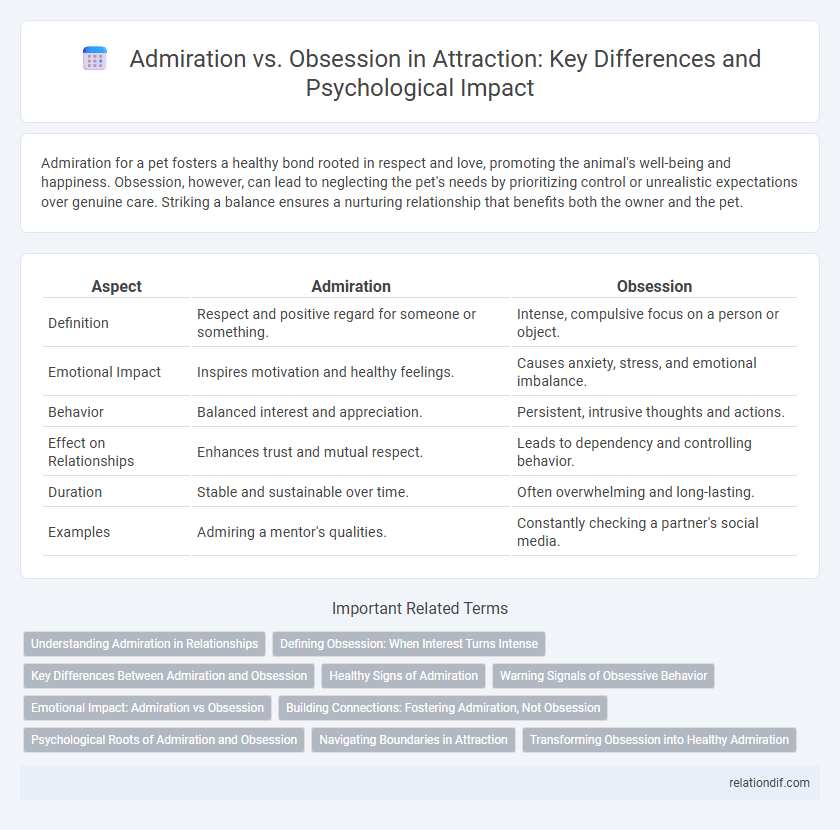Admiration for a pet fosters a healthy bond rooted in respect and love, promoting the animal's well-being and happiness. Obsession, however, can lead to neglecting the pet's needs by prioritizing control or unrealistic expectations over genuine care. Striking a balance ensures a nurturing relationship that benefits both the owner and the pet.
Table of Comparison
| Aspect | Admiration | Obsession |
|---|---|---|
| Definition | Respect and positive regard for someone or something. | Intense, compulsive focus on a person or object. |
| Emotional Impact | Inspires motivation and healthy feelings. | Causes anxiety, stress, and emotional imbalance. |
| Behavior | Balanced interest and appreciation. | Persistent, intrusive thoughts and actions. |
| Effect on Relationships | Enhances trust and mutual respect. | Leads to dependency and controlling behavior. |
| Duration | Stable and sustainable over time. | Often overwhelming and long-lasting. |
| Examples | Admiring a mentor's qualities. | Constantly checking a partner's social media. |
Understanding Admiration in Relationships
Understanding admiration in relationships involves recognizing genuine respect and appreciation for a partner's qualities, which fosters trust and emotional connection. Unlike obsession, admiration supports healthy boundaries and personal growth, encouraging mutual support and positive reinforcement. Cultivating admiration strengthens relationship satisfaction by promoting a balanced, respectful bond rather than dependence or control.
Defining Obsession: When Interest Turns Intense
Obsession emerges when admiration escalates into a consuming preoccupation, marked by persistent thoughts and an inability to detach emotionally. It involves a disproportionate focus on a person or idea that disrupts normal routines and impairs judgment. Understanding the shift from healthy admiration to obsessive fixation is critical in recognizing the psychological intensity of attraction.
Key Differences Between Admiration and Obsession
Admiration involves a healthy appreciation and respect for someone's qualities, fostering inspiration and positive feelings without losing personal boundaries. Obsession, by contrast, is an overwhelming preoccupation that disrupts rational thinking and can lead to controlling or unhealthy behaviors. Key differences include emotional balance in admiration versus emotional distress in obsession, as well as respect for autonomy compared to intrusive fixation.
Healthy Signs of Admiration
Healthy admiration in attraction involves appreciating someone's qualities without losing personal boundaries or self-identity. It encourages respect, trust, and genuine interest in the other person's well-being, rather than constant preoccupation or possessiveness. Recognizing these signs helps differentiate admiration from unhealthy obsession, promoting balanced and fulfilling relationships.
Warning Signals of Obsessive Behavior
Obsessive behavior is characterized by persistent, intrusive thoughts and actions that disrupt daily life and personal boundaries, unlike healthy admiration which respects individuality and autonomy. Warning signs include excessive monitoring, constant need for reassurance, and inability to accept rejection or distance. Recognizing these signals early helps prevent emotional harm and promotes healthy relationship dynamics.
Emotional Impact: Admiration vs Obsession
Admiration fosters positive emotional impact by inspiring motivation, respect, and a sense of connection without overwhelming intensity. Obsession triggers intense emotional arousal often characterized by anxiety, possessiveness, and compulsive thoughts that can disrupt mental well-being. Understanding the emotional distinctions between admiration and obsession helps maintain healthy boundaries in relationships and prevents detrimental psychological effects.
Building Connections: Fostering Admiration, Not Obsession
Building connections thrives on genuine admiration, which respects boundaries and encourages mutual growth, whereas obsession often leads to unhealthy attachments and emotional strain. Cultivating admiration involves appreciating someone's qualities and achievements without losing one's sense of self or overwhelming the relationship. Prioritizing admiration fosters balanced interactions and long-lasting bonds that enrich both individuals.
Psychological Roots of Admiration and Obsession
Admiration stems from a healthy psychological foundation characterized by respect, inspiration, and positive recognition of qualities or achievements, often fostering personal growth and motivation. Obsession, in contrast, is rooted in psychological factors such as insecurity, fixation, and compulsive thoughts, leading to distorted perceptions and overwhelming emotional dependence. Understanding these distinct psychological roots highlights how admiration promotes balanced attraction, whereas obsession can disrupt mental well-being and interpersonal relationships.
Navigating Boundaries in Attraction
Admiration in attraction fosters healthy boundaries by appreciating qualities without overwhelming focus, while obsession blurs limits, leading to possessiveness and emotional imbalance. Recognizing personal space and mutual respect helps maintain a balanced connection, preventing fixation from dominating interactions. Clear communication and self-awareness are essential to navigate these boundaries and sustain genuine attraction.
Transforming Obsession into Healthy Admiration
Transforming obsession into healthy admiration involves shifting focus from compulsive, uncontrollable thoughts to intentional appreciation of qualities that inspire growth and positivity. This process requires setting emotional boundaries, practicing mindfulness, and redirecting energy toward self-improvement and mutual respect. Cultivating admiration grounded in reality fosters balanced relationships and sustainable emotional well-being.
Admiration vs Obsession Infographic

 relationdif.com
relationdif.com